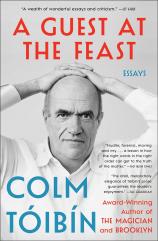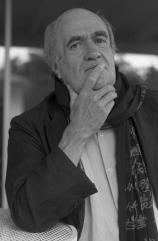A Guest at the Feast: Essays
Review
A Guest at the Feast: Essays
“It all started with my balls.” That’s the startling first sentence of “Cancer: My Part in Its Downfall,” the opening piece in A GUEST AT THE FEAST, the 10th work of nonfiction from prolific Irish novelist, short story writer, playwright, poet and critic Colm Tóibín. And it’s indicative of the quality of candor, insight and frequent wit that he displays in these essays and journalism, previously published between 1995 and 2022 in magazines that include The New Yorker and the London Review of Books.
Tóibín’s account of his battle with testicular cancer that spread to a lymph node and one lung is both revealing and laced with dark humor. He recalls the rigors of the chemotherapy treatments that sapped him of the energy to do much more than lie on his sofa (“pure blankness, punctured by pangs of depression that were close to unbearable”) and pain “so intense that I actually believed I was going to have a baby.” One episode involved a taxi driver who sped off after initially stopping to pick him up. Tóibín speculates that he mistook his prospective passenger for a heroin addict visiting a nearby methadone clinic. “In any case, he did me the great favor of making me realize that I looked like a bad Egon Schiele drawing,” he writes.
"[Tóibín's] visits to several churches and museums eventually lead him to reflect on another plague, the one that ultimately wiped out a quarter of the city’s population in 1575-76. It’s a haunting coda to this erudite and consistently stimulating collection."
The collection’s title essay is an extended and lovely piece of memoir describing Tóibín‘s years growing up in the small town of Enniscorthy, in County Wexford, and his student days at University College Dublin. Describing himself as existing in a “permanent state of dreamy distance,” as a youngster Tóibín was more class clown than model student, but he seems to have blossomed intellectually in Dublin, a city he found “glamorous, exciting, full of possibilities” at a time when Ireland was “opening itself to the outside world.” The essay concludes with enchanting recollections of his childhood home (“Sacred space; once it was ordinary”) and a pair of houses on the Irish coast that he visited during childhood summers.
Tóibín devotes nearly a third of the book to four pieces exploring deeply problematic issues in the contemporary Catholic Church, as he acknowledges he briefly considered entering the priesthood at age 16. In “The Paradoxical Pope,” the book’s only essay that predates 2000, he considers the papacy of John Paul II some 10 years before its end, remarking on the way that the popular but conservative pope offered “conciliation as well as condemnation, soft talk in the same breath as old-fashioned, authoritarian rhetoric.” For Tóibín, the papal reign he describes in “The Bergoglio Smile: Pope Francis” embodies similar contradictions, as he explains in detailing the current pope’s accommodation to the rule of Argentina’s generals during the era of the “Dirty War,” while skillfully cultivating an aura of populism and concern for the downtrodden during his papacy.
In “Among the Flutterers” and “The Ferns Report,” Tóibín is unsparing in his criticism of the Irish Catholic church, an institution whose power, he says, “is slowly and subtly eroding, but it is still strong.” The latter piece is especially damning, detailing the findings of an investigation into sexual abuse involving, among others, several teachers Tóibín knew from his days at Catholic boarding school and the way public knowledge of their conduct was suppressed by church authorities for years. To Tóibín, “the level of abuse in Ferns and the church’s way of handling it seemed an almost intrinsic part of the church’s search for power.”
The collection’s three pieces of pure literary criticism may not be as compelling for those not familiar with the work of the writers he surveys, including Pulitzer Prize-winning novelist and critic Marilynne Robinson, author of the Gilead quartet. Tóibín is an admirer of her work and her willingness to tackle religious themes (“God represents a real problem for the novelist,” he concedes), especially for the “confidence with which she merges [a] heightened, numinous world with the ordinary, the detailed, the credible” in her first novel, HOUSEKEEPING.
In two other essays, Tóibín considers the Irish novelists Francis Stuart and John McGahern, both of whom he knew personally. Stuart, who fought in the Irish Civil War and was a friend of W. B. Yeats, abandoned Ireland in 1940 for Germany, where, in radio appearances, he frequently trafficked in anti-Semitic tropes. In multiple post-war novels, Stuart attempted, with some success, to cast his wartime experience in a different light. Without offering him full absolution, Tóibín finds “something almost inspiring in the zeal with which he worked in his fiction at trying to rescue himself, heal himself, re-create his past.” McGahern presents an interesting contrast, as someone who, Tóibín says, “despite the autobiographical elements in his fiction, wasn’t especially interested in exploring his own psyche.”
A GUEST AT THE FEAST concludes with a brief, evocative essay, “Alone in Venice,” which describes Tóibín‘s experience in the city during the first year of the pandemic. His visits to several churches and museums eventually lead him to reflect on another plague, the one that ultimately wiped out a quarter of the city’s population in 1575-76. It’s a haunting coda to this erudite and consistently stimulating collection.
Reviewed by Harvey Freedenberg on January 20, 2023
A Guest at the Feast: Essays
- Publication Date: January 9, 2024
- Genres: Essays, Nonfiction
- Paperback: 336 pages
- Publisher: Scribner
- ISBN-10: 147678521X
- ISBN-13: 9781476785219




